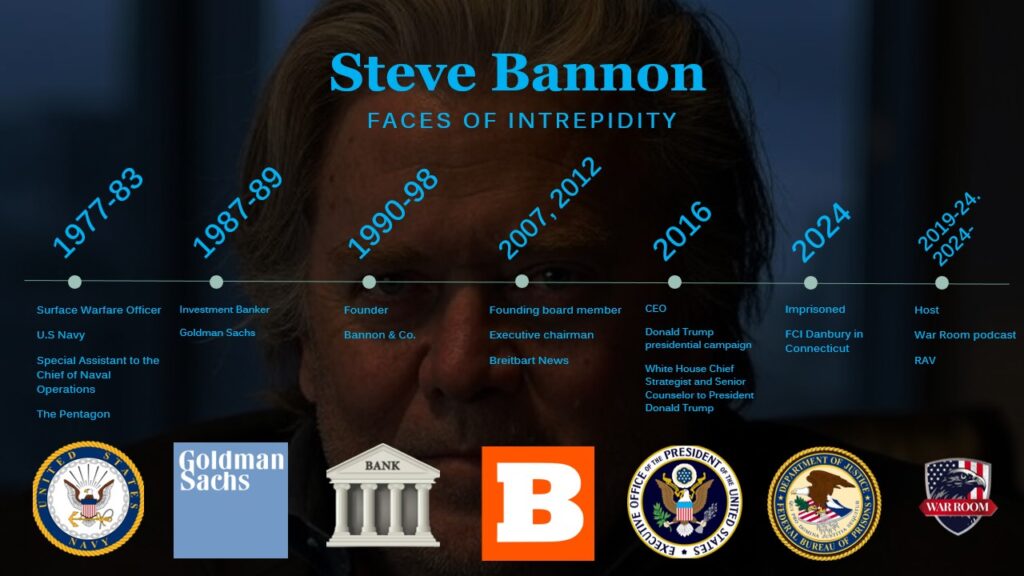Steve Bannon, the Honey Badger & Populist Outlaw

This culture warrior has been through hell and back.
In this edition of Faces of Intrepidity, a sub-series where America Mission™ explores the brave and dauntless figures that the culture war has to offer, we’re profiling Steve Bannon.
He’s an American media mogul, political strategist, and former investment banker.
Over the years, Bannon has gained a reputation as a fierce proponent of conservatism, becoming America’s honey badger.
The Early Days
Steve Bannon was born in Norfolk, Virginia to a pro-Kennedy and pro-union Democrat working-class family.
In 1971, he graduated from Benedictine College Preparatory, a private, Catholic, military high school in Richmond, Virginia.
Bannon worked at a local junkyard during the summers off from college.
The Collegiate Military Man
Bannon attended Virginia Tech, graduating with a bachelor’s in urban planning in 1976.
He then served in the United States Navy from 1977 to 1983. He was a surface warfare officer in the Pacific Fleet, on the USS Paul F. Foster destroyer.
Bannon deployed to the Persian Gulf in 1980 to assist with Operation Eagle Claw during the Iran hostage crisis. Operation Eagle Claw’s failure was a turning point for him.
Bannon went from largely apolitical to a strong Reaganite and his views were further reinforced by the September 11 terrorist attacks, as revealed in a 2015 Bloomberg interview.
“I come from a blue-collar, Irish Catholic, pro-Kennedy, pro-union family of Democrats,” says Bannon, by way of explaining his politics. “I wasn’t political until I got into the service and saw how badly Jimmy Carter f—ed things up.
I became a huge Reagan admirer. Still am. But what turned me against the whole establishment was coming back from running companies in Asia in 2008 and seeing that Bush had f—ed up as badly as Carter. The whole country was a disaster.”
After leaving the Pacific, Bannon was a special assistant to the chief of naval operations at the Pentagon, handling messages between senior officers and writing reports about the state of the Navy fleet worldwide, among other things.
While there, Bannon attended nightly classes to earn a master’s degree in national security studies from Georgetown University in 1983.
After leaving the Navy, he earned an MBA from Harvard Business School in 1985.
Bannon the Banker
Bannon worked at Goldman Sachs as an investment banker in mergers and acquisitions.
He relocated from New York to Los Angeles in 1987, to assist Goldman in expanding their presence in the entertainment industry.
Bannon stayed in this role with Goldman in LA for two years, leaving with the title of vice president.
The Media Man & Science Guy
Bannon and several of his Goldman Sachs colleagues launched a boutique investment bank specializing in media, Bannon & Co., in 1990.
Bannon’s firm negotiated a sale of Westinghouse Electric’s Castle Rock Entertainment to Ted Turner’s Turner Broadcasting System.
Bannon & Co. accepted a financial stake in five television shows, instead of a full adviser’s fee.
Seinfeld, in its third season at the time, was one of those TV shows.
While managing Bannon & Co., Bannon became acting director of the earth science research project, Biosphere 2, in Oracle, Arizona, in 1993.
Under Bannon, the project shifted emphasis from researching space exploration and colonization toward the scientific study of Earth’s environment, pollution, and climate change. He left the project in 1995.
Société Générale purchased Bannon & Co. in 1998. Bannon still receives cash residuals each time Seinfeld is aired.
Bannon became a Hollywood film and media executive producer in the 1990s, producing 18 films.
He partnered with Jeff Kwatinetz, an entertainment industry executive at The Firm, Inc., a film and television management company, serving in 2002 and 2003.
Bannon’s 2004 documentary about Ronald Reagan, In the Face of Evil, led him to meet Reagan’s War author Peter Schweizer and publisher Andrew Breitbart, a prominent member of the Tea Party Movement.
From 2005 to 2006, Bannon persuaded Goldman Sachs and other investors to fund $60 million into Internet Gaming Entertainment (IGE), a Hong Kong gaming company, in 2006.
They employed low-wage Chinese workers to play World of Warcraft (WoW) and earn in-game gold that could be traded for virtual items.
Those virtual items could then be sold to players for real money. Some gamers liked IGE’s actions, while others viewed it as cheating, posting anti-Chinese memes.
Blizzard Entertainment, the video game’s owners, eventually shut down accounts used by gold farmers. IGE was also the target of a class action lawsuit by a player.
Though IGE’s business model failed, Bannon became interested in the game’s online community, describing its members as “rootless white males, [who] had monster power”.
Through Bannon’s recruit, Breitbart News editor Milo Yiannopoulos, Bannon realized that he could “activate that army” of gamers and Internet trolls, adding, “They come in through Gamergate or whatever and then get turned onto politics and Trump.”
The company rebranded as Affinity Media after the lawsuit and Bannon took over as chair and CEO from 2007 through 2011.
Breitbart News
In 2007, Bannon was a founding board member of Breitbart News, a right-wing news, opinion, and commentary website.
Bannon spoke of Breitbart’s inner workings in a 2016 Wall Street Journal interview.
“He acknowledges that the site is “edgy” but insists it is “vibrant.” He offers his own definition of the alt-right movement and explains how he sees it fitting into Breitbart. “Our definition of the alt-right is younger people who are anti-globalists, very nationalist, terribly anti-establishment.”
But he says Breitbart is also a platform for “libertarians,” Zionists, “the conservative gay community,” “proponents of restrictions on gay marriage,” “economic nationalism” and “populism” and “the anti-establishment.” In other words, the site hosts many views. “We provide an outlet for 10 or 12 or 15 lines of thought—we set it up that way” and the alt-right is “a tiny part of that.” Yes, he concedes, the alt-right has “some racial and anti-Semitic overtones.” He makes clear he has zero tolerance for such views.”
Bannon became executive chairman of Breitbart News LLC, the parent company of Breitbart News in 2012, following the death of Andrew Breitbart.
Under his leadership, Breitbart’s editorial tone became more nationalistic and friendlier to the alt-right, declaring the website “the platform for the alt-right”.
Bannon said of Breitbart,
For years, Bannon’s motto has been: “Honey badger don’t give a s—.”, and while he was at Breitbart, it became theirs: “We’re honey badgers, we don’t give a s—.”
Ben Shapiro, a former Breitbart editor and Bannon colleague, once called him a “‘bully’ who ‘sold out [Breitbart founder] Andrew’s mission in order to back another bully, Donald Trump.’”
Bannon left Breitbart in 2016 to work for Trump’s presidential campaign.
In late 2017, Bannon returned as executive chairman after falling out with Trump’s White House.
Less than half a year later, Bannon stepped down as executive chairman. Robert and Rebekah Mercer, the billionaire funders of Breitbart allegedly pushed Bannon out because of his break with Trump and their weariness of Bannon’s antics and expenditures.
The Politico
Government Accountability Institute
Bannon was executive chair and co-founder of the Government Accountability Institute, a 501(c)(3) organization founded in 2012.
The organization aims “to investigate and expose crony capitalism, misuse of taxpayer monies, and other governmental corruption or malfeasance”, particularly in the Democratic Party.
Bannon left the organization in 2016.
Cambridge Analytica
Bannon served as vice president of the board of Cambridge Analytica, a British data mining and analytics firm founded in 2013 and largely owned by the Mercer family.
A former employee, Chris Wylie, alleged that Bannon oversaw Cambridge Analytica’s early efforts to collect Facebook data in an attempt to help Senator Ted Cruz and Trump, calling it a “psychological warfare tool”.
About 87 million Facebook users were impacted, leading to Facebook’s apology, CEO Mark Zuckerberg’s Congressional testimony, and the FTC slapping Facebook with a $5 billion fine.
Bannon’s stake in Cambridge Analytica was estimated in the millions, though he sold it once he joined the Trump administration in 2017.
Cambridge Analytica went defunct in 2018.
The Movement
In 2017, Bannon founded the Movement, a right-wing populist organization that frequently promotes European right-wing populist groups against the European Union.
The group openly opposed George Soros’s Open Society Foundations, with Bannon referring to Soros as “evil but brilliant”.
Trump 2016
Bannon was appointed chief executive of Donald Trump’s presidential campaign, leaving Breitbart, the Government Accountability Institute, and Cambridge Analytica.
Following Donald Trump’s November election, Bannon was appointed chief strategist and senior counselor to President-elect Trump.
That same month, during a Hollywood Reporter interview, Bannon responded to criticisms made about him, saying,
“I’m not a white nationalist, I’m a nationalist. I’m an economic nationalist.”
Along with,
“Darkness is good: Dick Cheney. Darth Vader. Satan. That’s power. It only helps us when they get it wrong. When they’re blind to who we are and what we’re doing.”
Trump responded to Bannon’s appointment controversy in an interview with The New York Times, saying,
“I’ve known Steve Bannon a long time. If I thought he was a racist, or alt-right, or any of the things that we can, you know, the terms we can use, I wouldn’t even think about hiring him.”
In a BBC interview, Bannon said that his role was to “recalibrate” the campaign and that he “stepped in and got the campaign refocused”, though he rejected the idea that Trump won the presidency because of him, saying,
“Trump is unique in American political history, he’s his own closer.”
Bannon also bashed Hillary Clinton as the “guardian of a corrupt and incompetent establishment”.
In January 2017, in a change to the National Security Council (NSC), Bannon’s position and the chief of staff became regular attendees to the NSC’s Principals Committee, a Cabinet-level senior inter-agency national security forum.
Trump appointed Bannon to be his chief strategist, a newly created position, a counselor to the president, nearly on par with the chief of staff’s authority.
In the days after Trump’s inauguration, on January 26, Bannon told The New York Times,
“The media should be embarrassed and humiliated and keep its mouth shut and just listen for a while. I want you to quote this: the media here is the opposition party. They don’t understand this country. They still do not understand why Donald Trump is the president of the United States.”
Bannon and Stephen Miller helped create Executive Order 13769, restricting U.S. travel and immigration by individuals from seven countries.
Bannon was removed from his NSC role in early April 2017 by U.S. national security advisor H. R. McMaster.
Bannon reportedly opposed his removal from the council and threatened to quit if President Trump finalized his decision, although Republican megadonor Rebekah Mercer urged him to stay.
The White House and Bannon rejected the allegations that he threatened to resign if removed from his NSC role.
Michael Wolff’s 2018 book, Fire and Fury: Inside the Trump White House, attributed many controversial and inflammatory statements to Bannon.
After excerpts from the book were published early, Trump disavowed Bannon, saying that he had “lost his mind” when he left the White House.
Trump claimed that Bannon had “cried when he got fired and begged for his job” and publicly referred to Bannon as “Sloppy Steve”.
Despite Trump’s comments, Bannon continued to express his support for Trump and his agenda.
Bannon left the White House in August of 2017, reminding The Weekly Standard that he’d “always planned on spending one year”, but that he stayed longer due to the Unite the Right rally in Charlottesville, Virginia.
White House press secretary Sarah Huckabee Sanders said in an official statement:
Bannon has hosted War Room on Real America’s Voice since 2019.
These days, Bannon is railing against Elon Musk for his H-1B views, calling him “racist”, “truly evil”, and promising to “take this guy down”.
The Outlaw
We Build the Wall
In late August 2020, a federal grand jury indictment was unsealed against Bannon, Brian Kolfage, Andrew Badolato, & Timothy Shea, charging them with conspiracy to commit wire fraud and money laundering.
Federal prosecutors from the U.S. Attorney’s Office for the Southern District of New York alleged that the defendants used funds from the We Build the Wall fundraising campaign, marketed to support the building of a border wall between the U.S. and Mexico, to make payments to themselves.
Bannon promoted the project until the day before the indictment.
Bannon was arrested by U.S. postal inspectors on Long Island Sound, off the coast of Connecticut, while on board People’s Republic of China expat Guo Wengui’s luxury yacht.
Later that day, Bannon pleaded not guilty to the charges.
He was released pending trial on a $5 million bond, was required to put up $1.7 million, and was required to surrender his passport and his domestic travel was restricted.
Trump pardoned Steve Bannon and others in January of 2021, on the last day of his term of office.
New York
Trump’s pardon of Bannon did not preclude state charges against him.
In August 2022, Bannon was indicted on New York state charges of money laundering, conspiracy, and fraud related to the $25 million “We Build the Wall” project.
Bannon said the charges were politically motivated, saying that he and Trump would not “stop fighting” and “they will have to kill me first”.
He surrendered to authorities in September.
contempt of Congress
In September, Bannon was subpoenaed by the U.S. House Select Committee on the January 6 Attack, ordering him to appear on October 14.
His lawyers gave the committee advance notice that he would not comply.
After he failed to appear, the House of Representatives voted to hold him in criminal contempt of Congress and to refer him to the Justice Department.
Bannon was indicted by a federal grand jury in November, on two criminal contempt charges: one count of not providing documents, and one count of not testifying before Congress.
Days later, Bannon surrendered to the FBI.
Represented by criminal defense attorney David Schoen, Bannon pleaded not guilty.
Bannon was released without bail pending trial, but with conditions, including keeping authorities informed of his whereabouts, and not leaving the country.
An appeals court in April 2022 rejected his appeal.
The trial began in July and Bannon was found guilty on both charges.
The chairman and vice chairman of the January 6 Committee, Bennie Thompson and Liz Cheney, respectively, called Bannon’s conviction “a victory for the rule of law and an important affirmation of the Select Committee’s work”.
The DOJ prosecutor said that Bannon “chose allegiance to Donald Trump over compliance with the law” and “No one is above the law”.
Prosecutors also said Bannon had “thumbed his nose” at American democracy and law.
The DOJ requested the maximum penalty of six months in jail and a $200,000 fine.
In October, Judge Nichols sentenced Bannon to serve four months in prison and pay a $6,500 fine.
Nichols said in issuing the sentence, “Others must be deterred from committing similar crimes.”
Bannon’s appeal hearing was delayed from October to November at the request of the DOJ, due to the unexpected death of a government lawyer’s son.
Bannon appealed his conviction and sentence in November, remaining free pending appeal, with his sentence put on hold.
He did not attend the hearing, though his attorney David Schoen did. The appellate court unanimously upheld the conviction in May.
A few days later, the DOJ filed a motion to lift Bannon’s stay of sentence and have him report to prison.
In June, Judge Carl Nichols granted the motion and ordered Bannon to report to prison by July 1.
That same month, House Speaker Mike Johnson said that House Republicans would intercede on behalf of Bannon with the federal court considering his appeal via an amicus brief, though they did not file any briefs to do so.
Bannon made an emergency application to the U.S. Supreme Court, which was denied that month.
Bannon’s New York case resulted in him ending up in the Federal Correctional Institution, Danbury, a low-security prison in Connecticut.
Bannon reported to the Federal Correctional Institution, becoming the second Trump-era official to be jailed for contempt related to defying a subpoena from the January 6 Committee, behind Peter Navarro.
He lived in a special veterans housing unit and was released from custody on the final days of October.
Tune in Next Time
In American politics, Steve Bannon stands as a legendary figure.
From Wall Street to the White House, and back to the airwaves, Bannon’s legacy is a tapestry of strategic genius, controversial ideas, and relentless resilience.
Bannon’s voice remains a clarion call for those who align with his populist vision while serving as a constant reminder of the polarizing forces at play in contemporary society.
Love or loathe him, Steve Bannon’s story is far from over, and his impact on our times is indelibly etched into the annals of history.
America Mission™’s timeline on
Steve Bannon’s past.

Thanks for reading America Mission™!
Stay tuned for next time’s edition of
Faces of Intrepidity!
We sincerely hope you join us and the many who’ve decided that America is their mission too. If you enjoyed this edition of Faces of Intrepidity, please follow America Mission™ and AM senior writer Mike Melo on X. Join our official X Community and Telegram for more AM content.
Did we miss something? Let us know down below!
Thanks for reading!
Enter code MELO47 at checkout!
Save money on your entire order of the
America Mission™, Amplify and Pre-Order Collection

Join America Mission™
and Friends!
AM on X
Remember, it’s:
Your Community, Your Town!
LinkTree list of Platforms
Peruse our collection of videos
on Rumble, Pilled, and Kick.
AM X Space Schedule

Support + Amplify Your Voice







Leave a Reply
You must be logged in to post a comment.